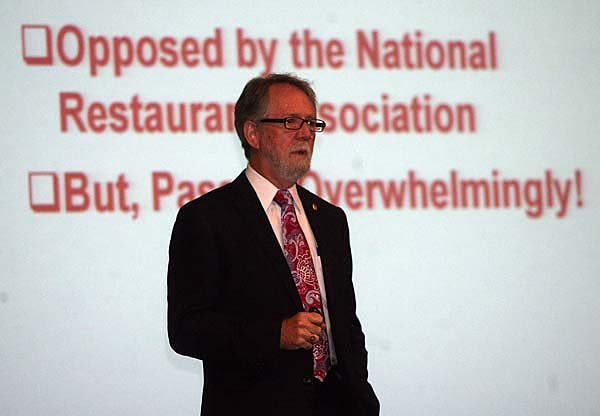FAYETTEVILLE — Priscilla Scanlan credits the Americans With Disabilities Act for allowing her to finally earn a college degree from the University of Arkansas.
Before the law and the days of interpreters for the hearing impaired, she attended school and tried to learn.
“I had to sit on the front row, and do my best lip reading,” Scanlan said during a panel discussion Wednesday afternoon at a symposium celebrating the law’s 20th anniversary. “And I flunked out.”
Scanlan spoke clearly to the audience. When it was other panelists’ turn to speak, an interpreter signed next to her, ensuring she understood them.
Years later, Scanlan returned to school an “old lady,” she said, and she earned her degree from UA-Fayetteville at last.
Scanlan was among disabled Arkansans and social services providers who came together Wednesday on the Fayetteville campus to celebrate the anniversary of the landmark disabilities legislation and ponder its impact.
Most agreed during theday-long symposium’s sessions that, while the disabilities act has changed lives, it is still a struggle to use it to protect the rights of people with disabilities to access public places and employment opportunities.
The Americans With Disabilities Act of 1990 was an improvement on an earlier federal law, Section 504 of the Rehabilitation Act of 1973, Rick Roessler a retired UA professor, said after a session on the disabilities law in the workplace.
“The thing the ADA did that was new was to talk about civil rights,” said Roessler, who retired June 30 from the rehabilitation, human resources and communication disorders department of UA’s College of Education and Health Professions. “504 said this: It said that if you receive federal funding in any way, that you have to prove reasonable accommodationsand access.”
The earlier law helped at places like public colleges and schools but not in the private sector, he said.
The most recent amendments to the disabilities act, once implemented, promise to strengthen some provisions in favor of those whom the law is designed to protect, Roessler said.
For instance, the definition of a protected disability will be broadened to include conditions even after the patient has controlled them with medications, he said. As examples, under the current law, patients with diabetes or seizure disorders have been unsuccessful in claiming those diseases as disabilities unless they abstain from insulin or seizure medication.
During another session on accessibility in public places, Stephen Donnelly, a consultant on disabilities legislation for Sources for Community Independent Living Services Inc. of Fayetteville, agreed with another panelist that the 1990 law was passed without enforcement “teeth.” Gaining compliance from business owners who serve the public is a complaint-driven enterprise.
During his presentation, Donnelly showed slides of a number of Fayetteville businesses that he said are still not compliant with the law 20 years after its original passage.
These included a number of Dickson Street shops and bars that didn’t take the opportunity during a neighborhood facelift a few years ago to replace a front-entrance step with a wheelchair ramp or other reasonable accommodations, he contended.
He also recalled a public area in Springdale where, years after its construction, someone finally noticed that the Braille signs for the visually impaired on the public rest rooms didn’t match the signs in English that read “Women” and “Men,” but instead were reversed.
When people e-mailed him complaints, he said, he works with the named businesses as much as possible to give them time to comply. Some work hard to remedy the problem, while others argue and remain defiant.
As a last resort, Donnelly said, he will report the matter to the Department of Justice, which oversees federal disabilities compliance regarding public access.
Sometimes though, he said, those filing the complaints misunderstand the law’s scope: “The ADA is not a matter of convenience - it’s a matter of accessibility.” The law might not require the closest parking spot in a particular situation, forexample.
While the landmark civil rights law for the disabled is something to hail, there’s plenty more to accomplish through educating the public and advocating for improvements, Scanlan said.
“Being deaf is a silent handicap - because we don’t look handicapped,” she said.
Northwest Arkansas, Pages 7 on 07/29/2010

